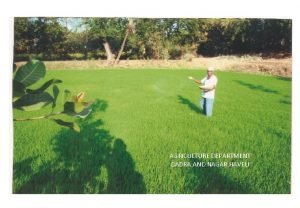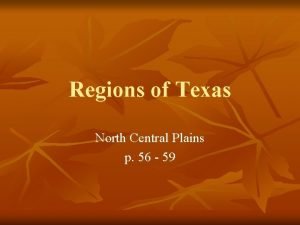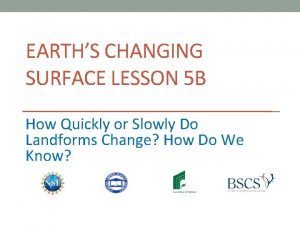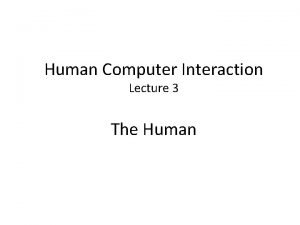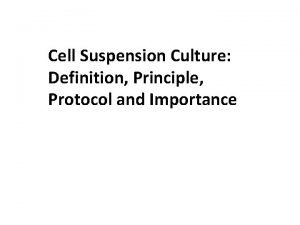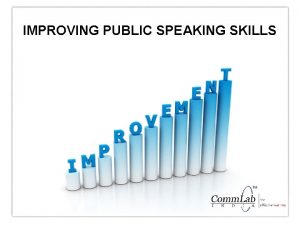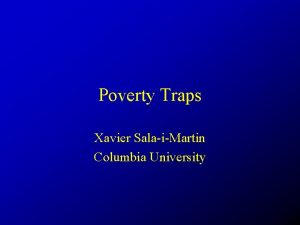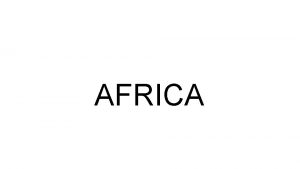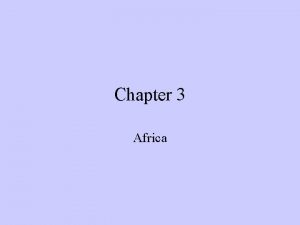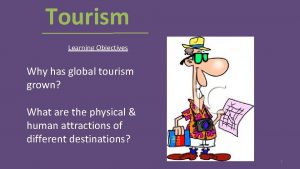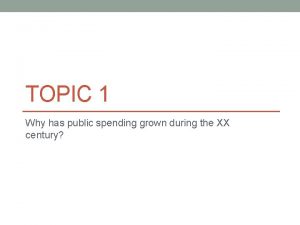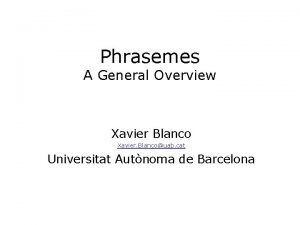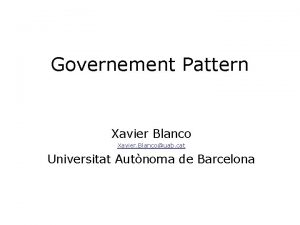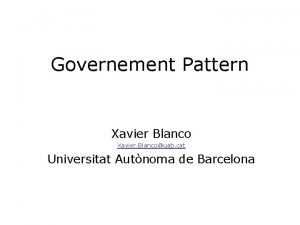Why has Africa Grown So Slowly Xavier SalaiMartin





































- Slides: 37

Why has Africa Grown So Slowly? Xavier Sala-i-Martin Columbia University









Distortions and the Cost of Investment • Investment is low in Africa • Investment is Expensive • Risk may be overstated


Survey of Business Leaders

Human Capital (1): Education • School Enrollments are low • Investment in Education does not lead to more enrollment: incentives • Education of GIRLS has added benefits in terms of Health and Fertility


Survey of Business Leaders

Human Capital (II): Health • Life expectancy has increased in African over the last 40 years but: – AIDS – Malaria • We now face a public health crisis, a pandemic of biblical proportions



Survey of Business Leaders

Geography, Tropics and Institutions • Most Sub-Saharan Africa has adverse • • Geography: Landlocked Tropical – Direct impact on productivity (soil, specific agricultural productivity, …) (Sachs and Warner 1995) – Direct impact on health and, thus, productivity (Sachs and Warner 1995) – Indirect impact on institutions (Acemoglu et al. 2000) • INSTITUTIONS AND NATURAL RESOURCES (Nigeria, Sala-IMartin and Subramanian 2003)


Survey of Business Leaders

Survey of Business Leaders. Corruption and the Natural Resource Curse

Survey of Business Leaders

Survey of Business Leaders

Openness (Globalization? ) • Africa is essentially CLOSED (1% of world trade) • And whatever Trade depends too much on a single natural resource (oil, diamonds, …)

Is Globalization to Blame? • What is it? Free Movement of – Capital – Labor – Goods – Technology – Information • Have any of these arrived in Africa?


Excessive Public Spending and “bad government”


Survey of Business Leaders

Survey of Business Leaders • See all the slides on Institutional Environment

Ethnic Fractionalization and Conflict • Countries at war between 1960 -2002: Algeria, Angola, Burundi, Chad, Cote d’Ivoire, Democratic Republic of Congo, Djibouti, Eritrea, Ethiopia, Guinea. Bissau, Liberia, Libya, Mauritania, Morocco, Mozambique, Namibia, Nigeria, Rwanda, Sierra Leone, Somalia, South Africa, Sudan, Togo, Uganda or Zimbabwe.


Survey of Business Leaders

USING BACE COEFFICIENTS

What to do? • African Countries – – – Peace Institutions/Markets Openness • Rich Countries: – Change AID Programs: • Focus on R&D – Open Markets (especially EU, USA and Japan ‘s agricultural protectionism) • NGOs: – Education (progresa-type programs) – Health (doctors without borders)
 Shade grown coffee vs sun grown
Shade grown coffee vs sun grown Pictures
Pictures My grown up christmas list link
My grown up christmas list link Maui grown coffee
Maui grown coffee All grown up and no place to go
All grown up and no place to go Agriculture practices projects in dadra & nagar haveli
Agriculture practices projects in dadra & nagar haveli North central plains crops
North central plains crops Ac swinburne appreciated marlowe as father of english
Ac swinburne appreciated marlowe as father of english The wild swans at coole questions and answers
The wild swans at coole questions and answers Fennec fox fully grown
Fennec fox fully grown Emperor tiberius grown
Emperor tiberius grown Dont ask why why why
Dont ask why why why Describe how weathering is seen in this tx ecoregion:
Describe how weathering is seen in this tx ecoregion: Regular adjectives
Regular adjectives Iscourse
Iscourse Rocky slowly got up from the mat
Rocky slowly got up from the mat Love grows slowly
Love grows slowly Language
Language What is earths thickest layer
What is earths thickest layer How do landforms change slowly
How do landforms change slowly Superlative of slowly
Superlative of slowly Which car
Which car Kintch
Kintch Episodic vs semantic memory
Episodic vs semantic memory Slowly by james reeves
Slowly by james reeves Thanhha lai pronunciation
Thanhha lai pronunciation Is the information is lost gradually but very slowly.
Is the information is lost gradually but very slowly. Culture definition
Culture definition Adverb for beautiful
Adverb for beautiful The slimy snake slithered slowly sideways
The slimy snake slithered slowly sideways The tiger crept slowly
The tiger crept slowly Map of the heart darkness
Map of the heart darkness The acorn grew slowly
The acorn grew slowly Speak slowly
Speak slowly The wheels of justice turn slowly figurative language
The wheels of justice turn slowly figurative language Speak slowly
Speak slowly The theory that evolution occurs slowly but steadily
The theory that evolution occurs slowly but steadily Four candle
Four candle





